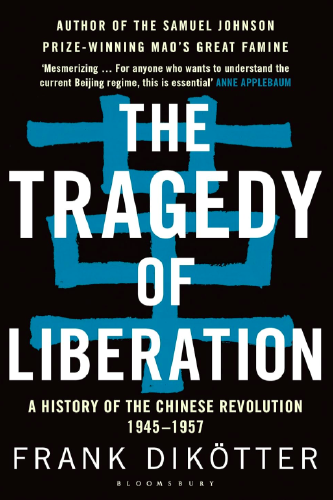
The Tragedy of Liberation
A harrowing account of the violence, famine, and repression that marked the early years of Communist rule in China, based on newly opened archives and survivor testimony.
Frank Dikötter’s “The Tragedy of Liberation” is a devastating chronicle of the first years of Communist rule in China, drawing on newly opened archives to reveal the scale of violence, famine, and repression that accompanied Mao’s rise. Dikötter argues that the period from 1945 to 1957, often mythologized as a time of hope and progress, was in fact marked by mass suffering and systematic brutality.
The book is packed with harrowing statistics: by 1952, at least 2.5 million people had been executed in the name of revolution, and millions more were sent to labor camps. Dikötter estimates that between 1949 and 1952, as many as 5 million people died as a result of political violence, starvation, and forced collectivization. “The violence was not a byproduct of revolution,” he writes, “but a fundamental part of the system.”
Dikötter details the horrors of land reform, where peasants were forced to denounce neighbors and family members, and the state seized property on a massive scale. “The party encouraged ordinary people to take part in the violence, to implicate themselves in the new order.” The collectivization campaigns that followed led to widespread famine and the destruction of rural life: “Villages were turned into labor camps, and hunger became a tool of control.”
The book is filled with survivor testimony and chilling archival evidence. One official report noted, “People died like flies,” while another described how “the countryside was littered with corpses.” Dikötter’s research uncovers the extent of torture, forced confessions, and the use of fear to maintain control. “No one was safe, not even the most loyal party members.”
Dikötter also explores the psychological toll of the regime’s constant surveillance and purges. “Trust evaporated. People learned to keep their heads down, to say nothing, to forget.” The trauma of these years, he argues, has yet to be fully reckoned with in China today.
“The Tragedy of Liberation” is a meticulously documented indictment of the early Communist regime, challenging official narratives and exposing the true cost of revolution. Dikötter’s work is essential reading for anyone seeking to understand the roots of modern China and the enduring scars of its past.
Intricately researched - the stories are unfathomably horrific: mass starvation, torture, brutal collectivization, labor camps, senseless egomaniacal projects, senseless deaths. Communism’s follies and deceits in China. Tragic atrocities that have yet to find reckoning, accountability, and healing. This is the China of my parents’ childhoods, and I want to understand their trauma. These accounts are overwhelming.